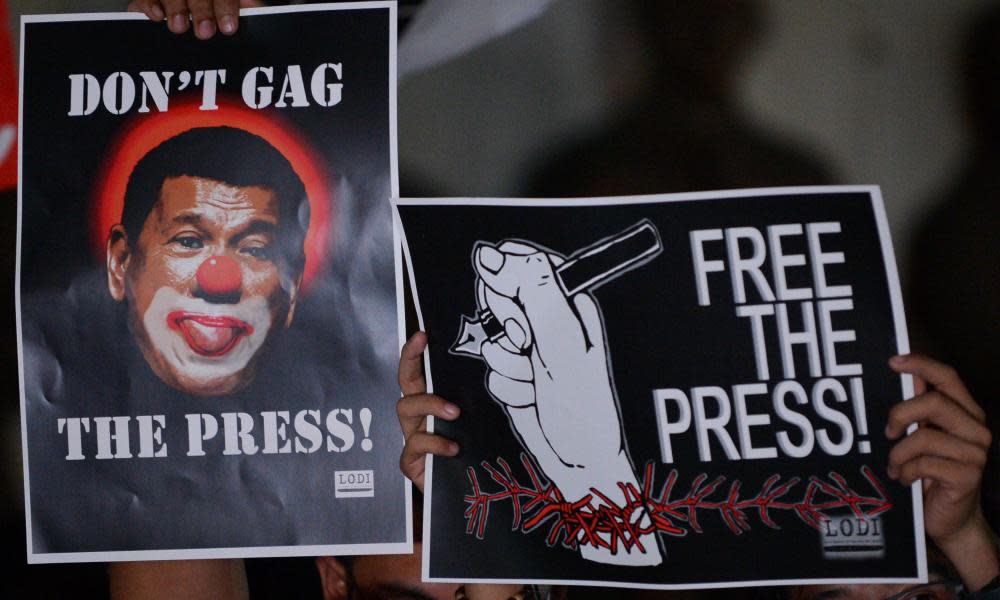Philippine editor accuses Duterte of 'weaponising' rule of law

The editor of a Philippine news organisation charged with tax evasion has accused the government of President Rodrigo Duterte of using “brute force and intimidation” and “weaponising” the rule of law against its critics.
Rappler, which was founded and is run by Maria Ressa, was charged with tax evasion over the weekend – the latest in an onslaught of government-initiated criminal charges and attacks on news organisations that have been critical of Duterte, putting the country’s free press at stake.
“This is a completely uneven legal battle that bends the rule of law till the point it’s nearly broken,” Ressa said. “The government are using the power of the law to harass and intimate media organisations they see as critics. I can’t think of any precedent for this in the 32 years I’ve been a journalist in the Philippines”
The government had accused the online news site – specifically Ressa, its executive editor – of failing to pay tax on the company’s 2015 bond sales to two foreign parties to the tune of $3m. If found guilty, Ressa could face up to 10 years in jail. Rappler denies all charges, which Ressa said were “without basis and clearly politically motivated”.
Rappler, which was founded by Ressa in 2012, has grown to be one of the most influential news websites in the Philippines. After the election of Duterte in 2016, Rappler was at the forefront in exposing the thousands of extrajudicial killings in the president’s bloody war on drugs and also worked to shed light on the army of trolls flooding social media with pro-Duterte propaganda and threatening critics and journalists.
The critical coverage of the Duterte administration angered the president, who began an all-out assault in attempt to muzzle Rappler. The government banned Rappler’s political reporter from the presidential palace. It ordered the Securities and Exchange Commission (SEC) to investigate Rappler for being “foreign-owned”, in what Ressa described as “fishing expedition”, and then revoked its licence in January.
The court of appeal found the case had no basis, so in March the SEC decided to investigate Rappler for tax evasion. Usually such investigations take a minimum of a year, but the SEC decided to press charges in just five months. The government also has an ongoing libel case against not just Rappler but its entire editorial staff and board.
“We were being investigated for this since March and we had prepared for everything but it’s like watching this slow-motion train wreck and you hope the drunk engineer will pull the brakes,” said Ressa.
“It’s hard when all we are trying to do is do our jobs as journalists. But we refuse to be intimidated. The fact that the government continues to attack us only means our sense of mission has never been so defined, our team has never worked as hard as it has now. We will continue to tell people when our democracy is fundamentally changing – which, right now, it is – and keep doing those tough stories.”
The independence of the supreme court in the Philippines, where the case is likely to end up, is widely acknowledged to be compromised by the fact it is filled with Duterte-appointed judges. Ressa said she knew the system was against them – “there hasn’t ever been a president who has as much power as President Duterte does now” – but said her hope lay with “those men and women in government who have the power to stand up and keep our democracy alive, to maintain the rule of law”.
“They shouldn’t allow fear or greed to co-opt them or let one man change an entire society,” she added. The timeline of the charges is unclear; it can take up to a decade for a case to reach the supreme court.
Duterte has an extremely antagonistic relationship with the press, often borrowing from Donald Trump’s playbook of branding critical stories as “fake news” and threatening reporters. He has personally attacked Rappler in speeches, and Ressa and her journalists have received death and rape threats from what has been described as the “pro-Duterte online troll army”, with Ressa receiving up to 90 death threats an hour on social media. The news site’s office in Manila has brought in extra security and debated installing bulletproof glass.
News of the charges prompted an outpouring of support from journalists around the world. Alan Rusbridger, the former editor of the Guardian, said on Twitter that the charges were “very concerning”, adding: “Maria Ressa is a great great journalist and needs all of our support.”
Lydia Polgreen, the editor of Huffington Post, said it was “an outrage”, and Ressa was “a journalist of the highest integrity”. Marty Baron, the editor of the Washington Post, described the charges as an “attack on one of the world’s bravest journalists”. David Clinch, the global news editor of Storyful, said: “We have your back Maria.”
The Reuters Institute for the Study of Journalism said in a statement: “Since 2016, the Philippine government and some of its supporters has repeatedly publicly threatened different news media including the broadcaster ABS-CBN, the Philippine Daily Inquirer, and Rappler in different ways, including questioning their license to operate, their tax affairs, and whether they are in fact journalists.
“Combined with organised online harassment and a climate of impunity when it comes to threats and violence against journalists, it creates the clear impression that the government and others are trying to intimidate independent media in the Philippines.”

 Yahoo News
Yahoo News 
